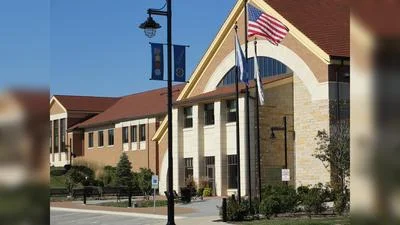Illinois State House District 52 issued the following announcement on Aug. 2
As the late Congressman Jack Kemp said, “If we have better ideas, we will win.” In Illinois, the Republican Party has a good chance to win if we’re bold and stand firmly for lower taxes, less spending and real reform. There should be a GOP “Contract with Illinois” based on a commitment to cut property taxes by 10 percent and roll back the 32 percent increase in the income tax rate that was passed in 2017.
Illinois residents face the highest total combined income tax, property tax and sales tax burden in the nation. Illinois also has the second-highest property taxes in the country. Despite the high Illinois tax burden, Moody’s estimates that Illinois’ unfunded pension liabilities stand at about $250 billion and Illinois has the worst credit rating in the nation. Illinois also has a $6.8 billion backlog of unpaid bills.
Predictably, people are leaving Illinois in droves. The Land of Lincoln lost more than 33,000 people net last year and has moved behind Pennsylvania in population to become the sixth most populous state. Illinois also might lose two congressional seats after the next census.
Illinois is an example of what happens when state leaders decide to ignore tried-and-true methods of economic growth and instead choose to double down on the disastrous policies of high taxes and out-of-control spending. Some politicians are now advocating to replace the Illinois flat income tax structure with a progressive tax structure. The result would surely be another massive tax increase.
Backers of a progressive income tax constitutional amendment claim that the progressive income tax would only target the wealthy. They want the General Assembly and Illinois voters to approve a progressive income tax without knowing the tax rates. If we look at the history of other high-tax blue states, we know that most Illinois citizens would end up paying higher taxes.
Many Illinois Democrats like to use California as an example of a progressive state that Illinois should emulate. If 2017 California tax rates are adopted in Illinois, a married couple with $150,000 of taxable income would pay 18.5 percent more in taxes. Illinois families with taxable income above $59,978 would face a state tax rate of 6 percent compared to the already too-high Illinois tax rate of 4.95 percent. The highest marginal tax rate in California is effectively 13.3 percent.
Illinois is at a crossroads. Does the state embrace the successful policies of low taxes, deregulation and spending reform, or will Illinois continue to follow the destructive path of high taxes?
The first key to promoting economic prosperity in Illinois is to cut property taxes. Specifically, the Illinois General Assembly needs to extend the statewide property tax cap to all units of government (including home rule units of government) and then mandate a 10 percent cut in property taxes levied over two years (5 percent per year). Property tax would then be permanently frozen unless local voters approve an increase.
Local governments will be forced to cut administrative expenses and make hard spending decisions just like hard-working Illinois families are required to do every day. Illinois has 7,000 units of local government. The key to long-term lower property taxes is to give voters the right to consolidate many local governments.
The second transforming item is for the General Assembly to repeal the 32 percent increase in the income tax rate approved last year. The tax hikes are hurting Illinois families and small businesses and driving more people out of the state. The recently approved unbalanced budget, which relies on the revenues from the tax hike, is the wrong approach.
State spending needs to be cut in Illinois. Taxpayers want bold real spending reform in Illinois. They are tired of the waste and mismanagement in state government. Taxpayers have had enough.
The best way to reduce spending is to enact meaningful pension reform. Currently, Illinois gives public employee retirees a 3 percent compounded benefit increase each year. Arizona, like Illinois, has a constitution that makes changing pension benefits very difficult. The best path for Illinois is to follow the Arizona model and pass a constitutional amendment to limit annual benefit increases. Also, all new workers need to participate in a 401 (k) plan.
The next way to reduce Illinois spending is to do a much better job of managing the state’s Medicaid program. Illinois should be actively pursuing multiple innovative waivers that would save money and make the program more efficient. We should also be aggressively fighting to increase the federal government’s unfairly low 50 percent Medicaid matching percentage for Illinois. Many other states are receiving a far higher percentage of federal support. We have to make sure that the truly needy continue to receive Medicaid, but eligibility needs to be tightened. Approximately 25 percent of Illinois citizens receive Medicaid benefits compared to 17 percent for Wisconsin.
Nationally, tax cut and deregulation policies are helping to produce an economic boom with low unemployment and high growth. It’s time for Illinois Republicans to be bold and run on a platform of cutting property taxes and income taxes. Those are better ideas that will produce a win for real reform.
Original source can be found here.






 Alerts Sign-up
Alerts Sign-up